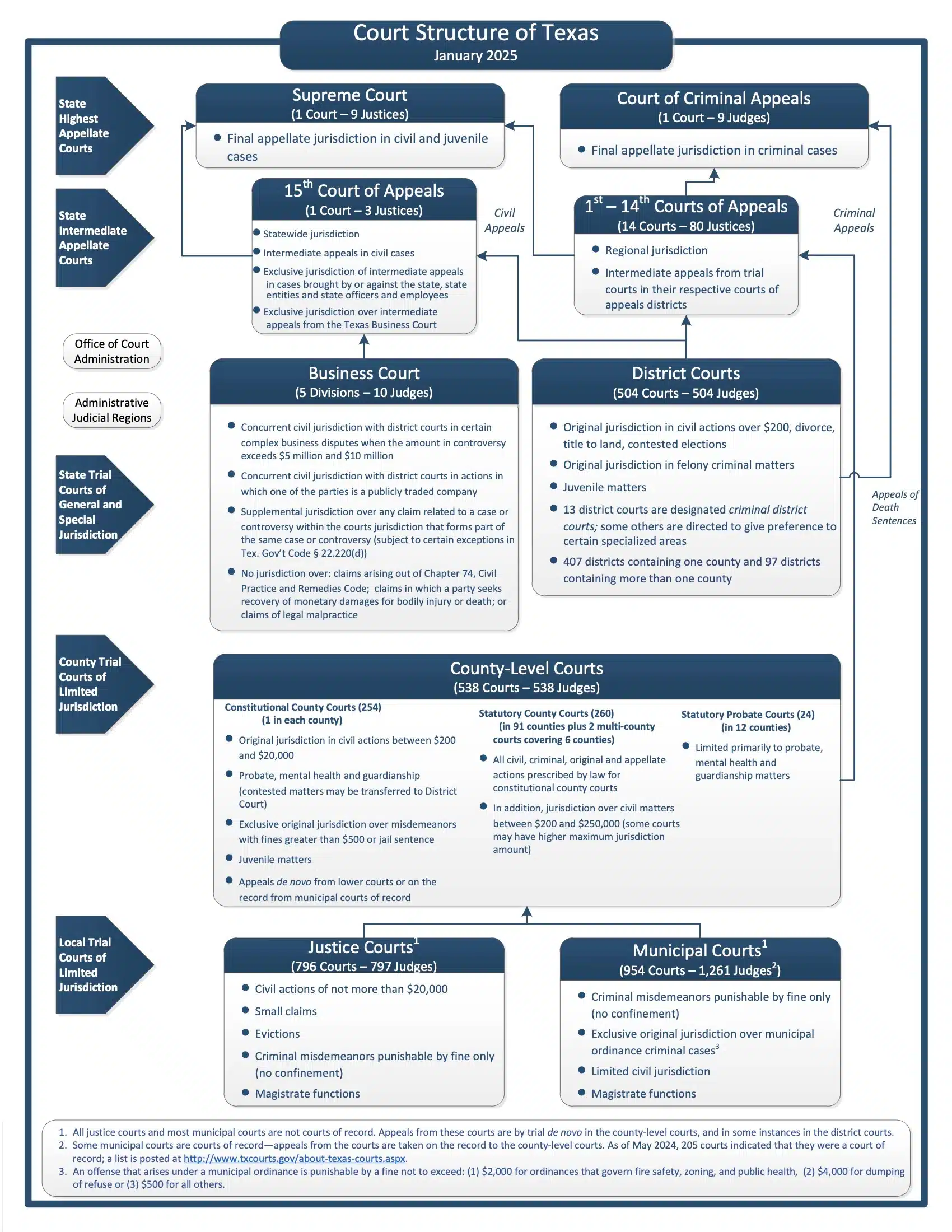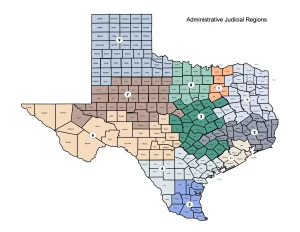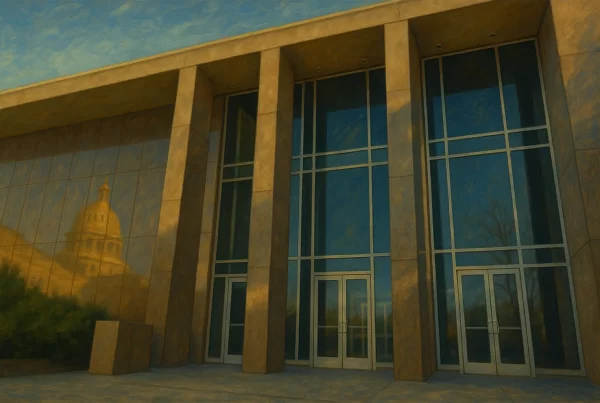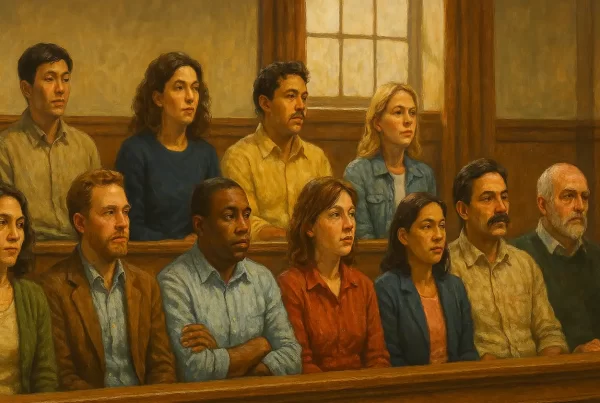The Texas judiciary is the system of courts that interprets and applies the law when crimes are committed in Texas, and adjudicates civil cases, such as business disputes, divorces, inheritance matters, and civil rights matters. Together with the legislature and the executive branch, the judiciary is considered one of three co-equal branches of state government.
The Texas court system consists of five layers: local courts (municipal courts and justice of the peace courts), county courts, district courts, regional appellate courts, and two high courts. Additionally, the Texas judiciary has a dedicated network of business courts, created in 2024 to handle complex litigation involving corporate governance matters, high-value contract disputes, and certain other matters.
Texas’s judiciary has similarities to the federal judiciary and the judicial systems of other U.S. states, but also has its own unique characteristics.
Judicial Elections
Texas belongs to a minority of U.S. states that selects most of its judges in partisan elections, meaning candidates run with political party affiliations indicated on the ballot. By comparison, some states elect judges in nonpartisan elections, others use gubernatorial or legislative appointments, and others rely on an independent commission that nominates judges.
In Texas, judicial elections are held at different levels, including county courts, district courts, and appellate courts. Candidates must meet certain qualifications for office. For example, most judges must have a law degree and a certain number of years of experience, depending on the position, though justices of the peace are not required to have a law degree.
The partisan election system has led to concerns about the influence of political contributions and voter decision-making based on party affiliation rather than judicial qualifications. Some have advocated for reforms such as merit-based appointments or nonpartisan elections.
When judicial vacancies occur between elections, the governor can appoint replacements, who must then run in the next election cycle to retain their seats.
Hierarchy of the Texas Judiciary

Appellate Courts in Texas
Regional Courts of Appeal
Regional appellate courts in Texas serve as intermediate courts that review decisions from lower trial courts. The state is divided into 14 appellate districts, each with a regional Court of Appeals that hears both civil and criminal appeals, except for cases involving the death penalty, which go directly to the Texas Court of Criminal Appeals.
These courts do not conduct new trials but instead review trial court records, legal arguments, and applicable laws to determine whether any errors occurred that warrant a reversal or modification of the lower court’s decision. Their rulings help shape legal precedent and ensure consistency in the application of Texas law.
Advertisement
Final Criminal and Civil Appeals
At the top of the Texas court system are the Texas Supreme Court, the highest state appeals court for civil matters, and the Texas Court of Criminal Appeals, the highest state appeals court in criminal matters. Texas is one of only two states to have two high courts of equal standing, a system that arose from unique historical circumstances.
Both courts have wide-ranging discretion to review appeals from lower courts, and play a crucial role in shaping Texas law by issuing final rulings on significant legal issues and setting binding precedents for lower courts.
Additionally, each high court has rulemaking authority that shapes the practice of law in both the trial courts and appellate courts throughout the state. The Texas Supreme Court holds general rulemaking authority over civil procedure, establishing guidelines that govern how civil cases are conducted, while the Court of Criminal Appeals has the power to adopt rules of evidence and procedure for Texas criminal cases, provided they do not conflict with state law.
Trial Courts in Texas
Trial courts in Texas decide cases either on the basis of a jury trial or a bench trial, in which a judge decides the verdict.
District courts are the state’s trial courts of general jurisdiction. Each district court serves a particular geographical area established by statute. District courts handle serious criminal cases (felonies), divorce cases in certain jurisdictions, and major civil disputes. Generally, district courts do not handle lesser crimes, known as misdemeanors.
In addition to these state courts, the Texas Constitution provides for a constitutional county court in each county, presided over by the county judge. To aid these county courts in populous counties, the Legislature has established county courts at law and probate courts. County courts handle misdemeanor criminal cases, and certain civil and family law matters, while probate courts handle inheritance matters and guardianship cases.
Within counties, justice courts handle small claims matters and certain misdemeanor crimes. They share jurisdiction with the county courts in small claims matters, depending on the amount in question. Some Texas cities also have their own municipal courts. These courts have original jurisdiction over violations of municipal ordinances and concurrent jurisdiction with the justice courts in fine-only misdemeanor cases.
Regional Presiding Judges
In Texas, the judiciary is divided into 11 administrative judicial regions, each overseen by a regional presiding judge. Appointed by the Texas Supreme Court, regional presiding judges are experienced sitting judges or retired judges, each serving a four-year term.
The overall responsibility of regional presiding judges is to help maintain an orderly, fair, and efficient judicial process across Texas. Their specific duties include:
- coordinate continuing education programs for judges;
- advise local judges on case flow management and auxiliary court services;
- address administrative and disciplinary matters within the judiciary;
- promulgate regional rules and practices;
- implement and execute statewide judicial rules;
- make recommendations to the Texas Supreme Court;
- appoint a judicial mentor or arrange for additional administrative personnel to be assigned to courts identified as needing assistance.
To assist with these duties, each presiding judge is authorized to employ, directly or through a contract with another governmental entity, one full-time or part-time administrative assistant.

By law, regional presiding judges are required to convene an annual “Council of Judges,” attended by all district and statutory county court judges within the administrative region. They may also convene special meetings of the judges at any time. The purpose of these meetings is to consult on “the state of the civil and criminal business in the courts of the administrative region and arranging for the disposition of the business pending on the court dockets,” and to adopt regional rules and practices concerning administration, record keeping, the order of trials, etc.
Regional presiding judges also serve as a bridge between local courts and the appellate courts. They attend annual and special meetings convened by the Chief Justice of the Texas Supreme Court “to promote more effective administration of justice.”
Advertisement
Local Administrative Judges
Local Administrative Judges in Texas serve as the primary judicial administrators within each county, helping ensure the effective operation of trial courts. These are typically district or statutory county court judges who assume additional responsibilities beyond hearing cases.
There are two types of local administrative judge: district and statutory county court administrative judges, one of each per county. The former are chosen by the district court judges within the county, while the latter are chosen by the statutory county court judges. They fulfill the same functions for the district and county court systems, respectively.
Under the Court Administration Act, local administrative judges have a wide range of duties, including:
- Implementing and enforcing local rules of administration.
- Managing the assignment and scheduling of cases among judges in their jurisdiction.
- Supervising the general docket to promote the prompt and efficient disposition of cases.
- Coordinating the use of courtrooms and other facilities.
- Handling complaints about judges’ judicial conduct at the local level.
- Reporting caseload and court activity information to the Office of Court Administration.
- Promoting judicial education and encouraging the use of visiting judges when needed.
By managing administrative tasks and coordinating judicial functions, local administrative judges help ensure the consistent and effective operation of the Texas trial court system.
Judicial Branch Agencies
In addition to the courts themselves, the Texas judiciary comprises several support agencies that operate under the oversight of appointed boards:
- Office of Capital Writs: represents death row inmates in state post-conviction habeas corpus and related proceedings.
- Office of Court Administration: provides resources and information for the efficient administration of the Judicial Branch of Texas.
- State Commission on Judicial Conduct: investigates allegations of judicial misconduct or judicial disability, and disciplines judges.
- State Law Library: public research library that serves judges and lawyers.
- State Prosecuting Attorney: represents the state in prosecutions before the Court of Criminal Appeals, the state’s highest criminal court.
Texas Judicial Council
The Texas Judicial Council is the policy-making body for the Texas judiciary, consisting of 22 members, including judges, lawyers, and legislators. The Council studies organizational problems and complaints within the judiciary and makes recommendations for addressing them to the state supreme court and legislature.
The Council is chaired by the Chief Justice of the Supreme Court, with the Presiding Judge of the Court of Criminal Appeals serving as vice chair.
Court Financing
The state government finances appellate courts in Texas, as well as the base salaries of district judges and certain county court judges, while the county governments pay the operating costs of district courts and county counts.
Most counties also supplement the base salary of district and county judges. Cities finance all costs related to the operation of municipal courts, including judges’ salaries.
The state also pays for or supplements some other expenses of the judicial branch, including juror pay, basic civil legal services, criminal indigent defense, judicial technology, and special prosecution units.
The judiciary accounts for only a sliver of state spending: 0.36% of all state appropriations in FY 2021.
State of the Judiciary Address
Every two years, the Chief Justice of the Texas Supreme Court delivers a speech to a joint session of the legislature evaluating the statewide judiciary, assessing problems and improvements, and advocating for legal or constitutional changes, new programs, or increased funding.
The tradition began in 1979, following passage of a law mandating the biennial speech. The law was intended “to promote better understanding between the legislative and judicial branches of government and promote more efficient administration of justice in Texas.”
Additional Resources
- Texas Judiciary Website
- Texas Law Help
- E-Books from the Texas Law Library
- Constitution and Laws of Texas
- reSearchTX (document filing system for Texas courts)



